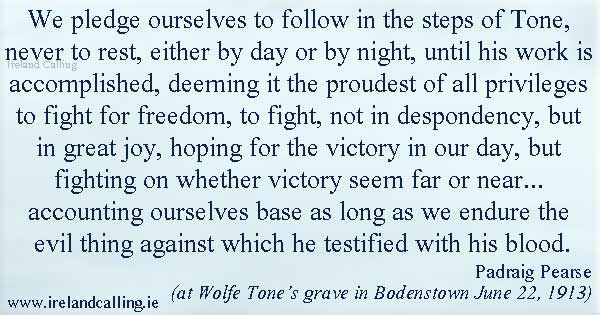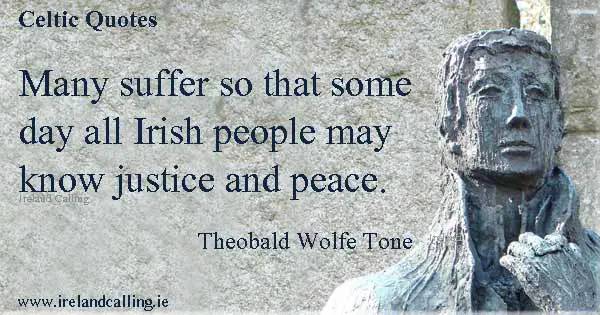Theobald Wolfe Tone was a founder member of the United Irishmen – a political party wanting parliamentary reform in the late 18th century.
It developed into a revolutionary republican organisation (inspired by American and French Revolutions).
The United Irishmen led the 1798 Irish Rebellion, with the aim to form an independent Irish republic, free from British rule.
Wolfe Tone is regarded as the father of Irish republicanism.
Although the Irish Rebellion was supported by the French, their help didn’t arrive quickly enough. Wolfe Tone was arrested when his ship carrying thousands of French soldiers was intercepted by the British at Lough Swilly, Donegal.
Wolfe Tone was sentenced to be hanged as a convicted traitor to the British Crown for his involvement in the 1798 Irish Rebellion. He wanted a soldier’s death by firing squad – which he was refused, so Wolfe Tone cheated the hangman by cutting his own throat and died in his cell eight days later.
When he was captured by the British, Wolfe Tone said,
“From my earliest youth I have regarded the connection between Ireland and Great Britain as the curse of the Irish nation, and felt convinced, that while it lasted, this country would never be free or happy. In consequence, I determined to apply all the powers which my individual efforts could move, in order to separate the two countries.”
* * *
Our freedom must be had at all hazards. If the men of property will not help us they must fall; we will free ourselves by the aid of that large and respectable class of the community – the men of no property.
* * *
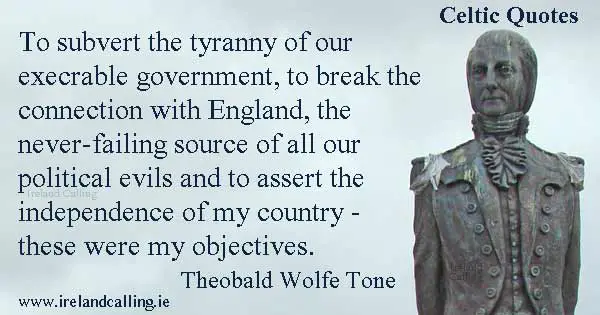
* * *
I have been lately introduced to the famous Thomas Paine, and like him very well. He is vain beyond all belief, but he has reason to be vain, and for my part I forgive him.
He has done wonders for the cause of liberty, both in America and Europe, and I believe him to be conscientiously an honest man. He converses extremely well; and I find him wittier in discourse than in his writings, where his humour is clumsy enough.
* * *
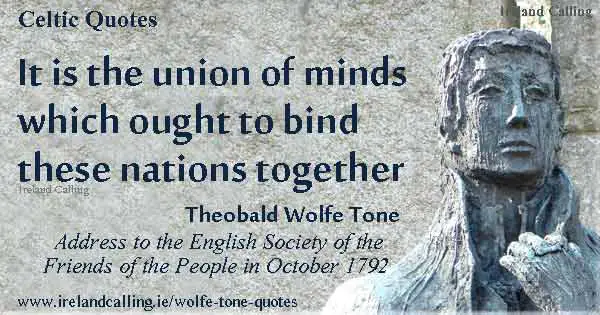
* * *
The English government having determined not to respect my rights as a French citizen and officer, and summoned me before a court martial, I have been sentenced to death.
I have served the Republic faithfully, and my death, as well as that of my brother, a victim like myself, and condemned in the same manner about a month ago, will sufficiently prove it.
I have sacrificed for the Republic all that man holds dear – my wife, my children, my liberty, my life.
* * *
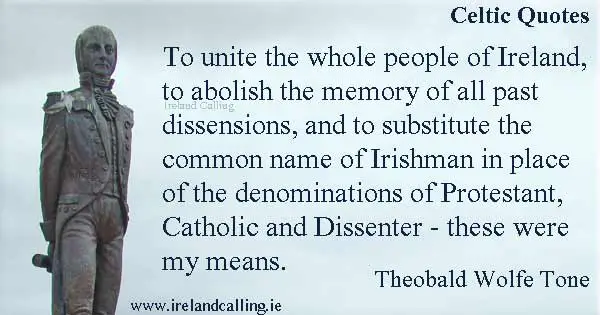
* * *
I have laboured to abolish the infernal spirit of religious persecution by uniting the Catholics and Dissenters.
To the former, I owe more than ever can be repaid. The service I was so fortunate as to render them they rewarded munificently but they did more: when the public cry was raised against me, when the friends of my youth swarmed off and left me alone, the Catholics did not desert me.
They had the virtue even to sacrifice their own interests to a rigid principle of honour. They refused, though strongly urged, to disgrace a man who, whatever his conduct towards the Government might have been, had faithfully and conscientiously discharged his duty towards them and in so doing, though it was in my own case, I will say they showed an instance of public virtue of which I know not whether there exists another example.
Theobald Wolfe Tone at the time of his Court-Martial (speaking to the people from the dock)
* * *
This is the speech Padraig Pearse gave at the grave of Wolfe Tone in Bodenstown churchyard June 22, 1913.
